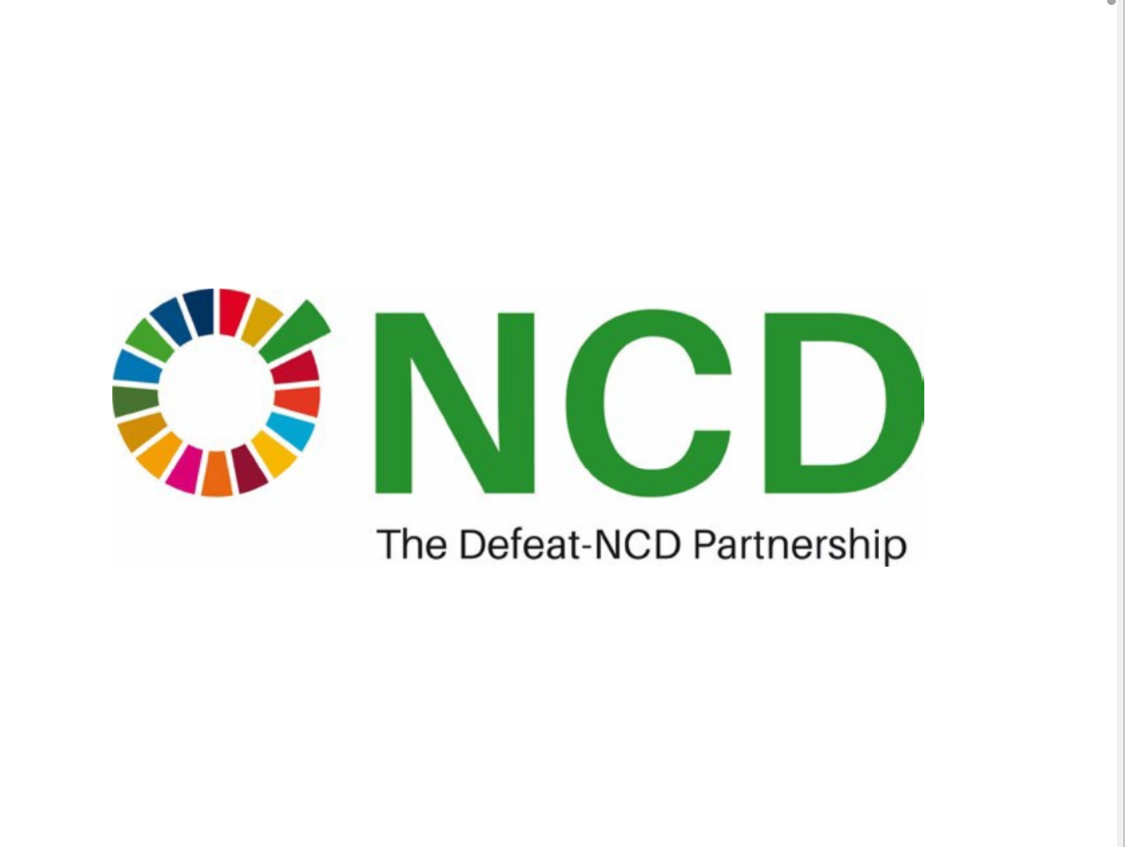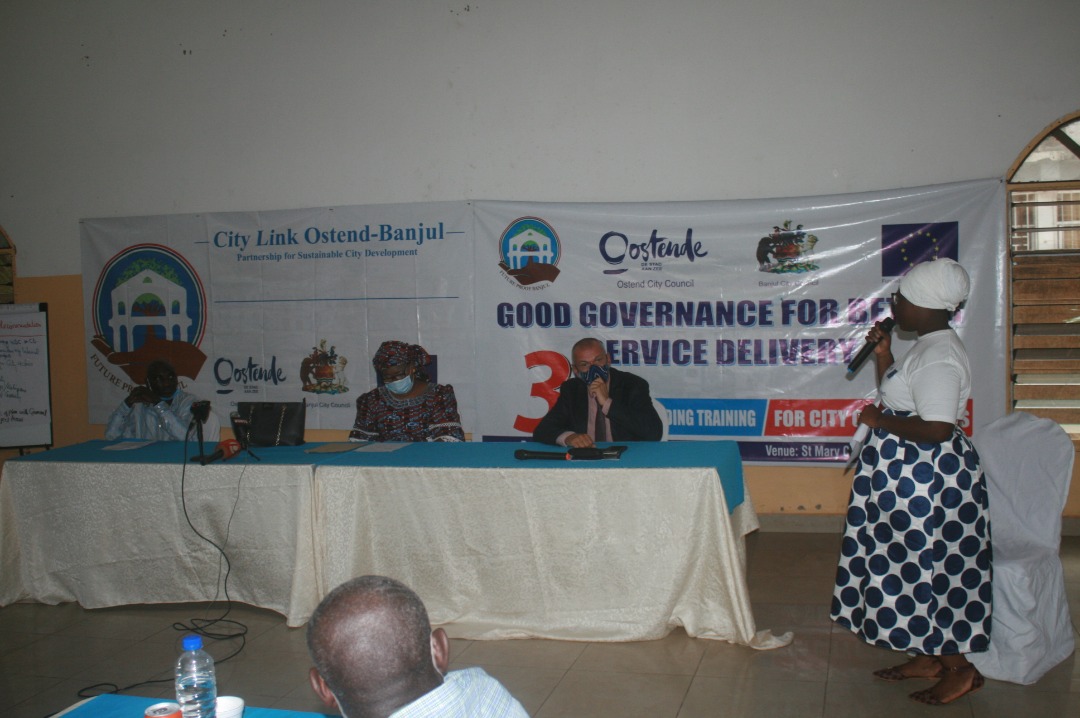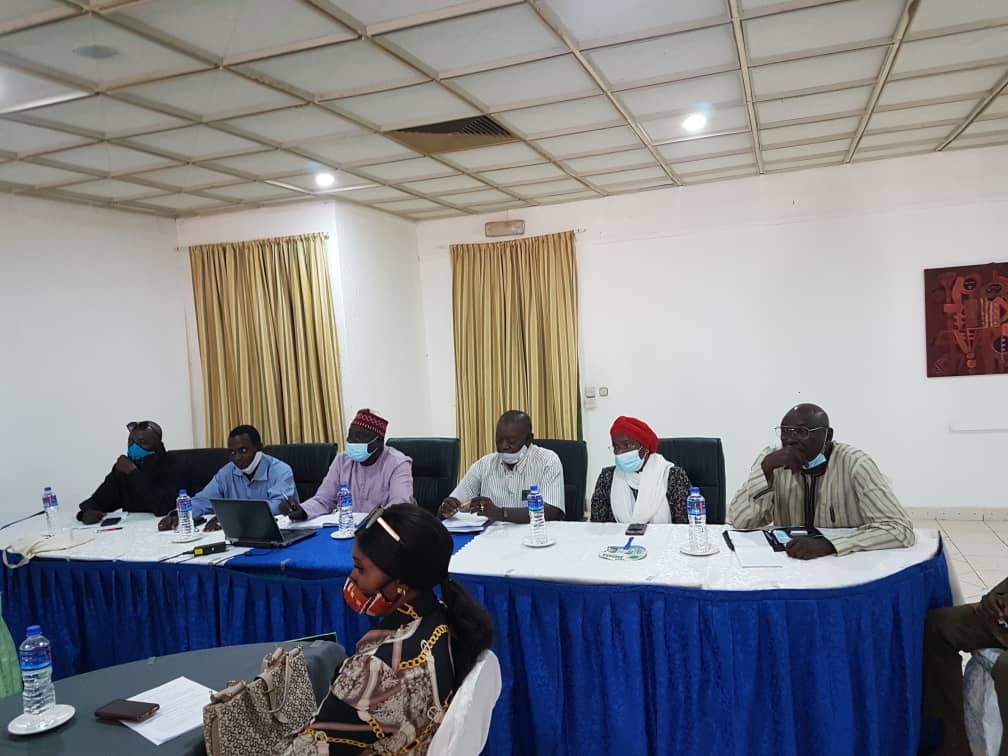PROGRAMME COORDINATOR FOR THE GAMBIA, THE DEFEAT-NCD PARTNERSHIP
VACANCY: Programme Coordinator for Th Gambia
ORGANISATION: The Defeat-NCD Partnership
LOCATION: Banjul, The Gambia
CONTRACTUAL MODALITY: Independent Contractor/ Service Provider
DURATION: 1 year with possibility of extension, subject to satisfactory performance andavailability of funds.
AREAS OF SPECIALISTATION/ THEMATIC AREAS:
Public Health; Supply Chain Management; Medicines Procurement; Project Design,Implementation, and Management; Resource Mobilization; Partnership Development; Training and Capacity Building; Health Innovation; Health Policy Development; High-levelRepresentation; Strategic Planning; and Organisational Development.
ORGANISATIONAL CONTEXT:
ABOUT THE DEFEAT-NCD PARTNERSHIP
The Defeat-NCD Partnership is a practical evidence-based response to the widespread call for action on non-communicable diseases (NCDs).
We are a public-private-people partnership that envisions universal health coverage for NCDs.We assist low-resource countries that are either economically or institutionally challenged toscale-up sustained and sustainable action on NCDs.
The Defeat-NCD Partnership was launched at the 73rd United Nations General Assembly inNew York on 24th September 2018, with the strong support of the World Health Organization(WHO), has been hosted by the United Nations since its original set-up. In 2023 it has beenestablished as an independent organization headquartered in Geneva, in accordance withArticles 60 et sequent of the Swiss Civil Code.
The Defeat-NCD Partnership continues to strengthen its ongoing work and collaboration withits long-term strategic partners within the United Nations System, including WHO, andespecially the United Nations Institute for Training and Research (UNITAR) with which it hasconcluded a long-term strategic partnership agreement to further the co-development, resource mobilisation, and implementation of joint projects and activities related to areas including NCDs, digital health, training, research, and capacity building.
Our efforts are aimed specifically at Sustainable Development Goal (SDG) 3.4 on the reduction by 2030 of one-third of premature mortality from NCDs through prevention and treatment. But our contribution also helps towards other SDGs on universal health coverage (3.8), health training and workforce (3C), country capacity development (3D), as well as SDG
5 on gender equality, SDG 10 on reducing inequality, SDG 13 on building knowledge and capacity to meet climate change, and SDG 17 on mobilising additional finances for
development. Our practical work is organised under four key action pillars:
- National NCD Capacity Building: The purpose of this pillar is to ensure that partner countries
have essential institutional capacities, structures, systems, and financing in place to tackle
NCDs in a sustained and sustainable manner. - Community Scale-Up of NCD Services: This Pillar seeks to bring more of the necessary
prevention and management of NCD services directly to more people who need them. - Affordability and Accessibility of Essential NCD Supplies: This Pillar enables the consistent
provision of affordable essential NCD medicines, diagnostics, and equipment in low resource
countries. - Financing for Country-Level NCD Programming: The objective of this Pillar is to establish
context-specific long-term sustainable financing models for NCD programming in low-resource
countries.
The GAMBIA
A principal focus for The Defeat-NCD Partnership was on the West African nation of The Gambia which bears a very high burden from NCDs: 34% of all total annual mortality, with cancers, chronic respiratory conditions, and diabetes as the top killers. Hypertension, obesity, and smoking are the critical risk factors, and diabetic retinopathy the leading cause of blindness among the working age population. Meanwhile, The Gambia is one of the world’s poorest low-income countries with limited programming capacity.
The Defeat-NCD Partnership provided technical assistance to The Gambia Ministry of Health to complete and launch its Costed Action Plan, alongside the World Health Organization and World Bank. The launch was by the President of The Gambia signifying strong national leadership commitment. The Costed Action Plan seeks US$ 57.8 million over the five years of
The Gambia’s National Multisector NCDs Strategy 2022-2027, to reduce NCD mortality by over a third.
The ongoing assistance of The Defeat-NCD Partnership to The Gambia seeks to help the
nation acquire domestic and international resources, mobilise and expand implementation capacity for NCD education, prevention, and control in government and non-government increase reliable and affordable access to essential NCD supplies, and assist the quality monitoring and evaluation of the programme.
The Defeat-NCD Partnership in collaboration with the Gambia Ministry of Health has gone on to mobilise US$ 650,000 from the World Diabetes Foundation for The Gambia Costed Action Plan, through our joint resource mobilisation efforts. This will go towards implementation with local partners on implementation of Gambia’s National NCD Strategy that has six priority areas: raising priority for NCD prevention and control at national and regional levels through strengthened collaboration and advocacy; strengthening national NCD capacities, leadership, governance, multi-sectoral action and partnerships to accelerate country response for the prevention and control of NCDs; reducing risk factors for NCDs and underlying social determinants though health-promotion and education; strengthening health systems to address the prevention and control of NCDs and the underlying social determinants through
people-centred primary health care and universal health coverage; promoting and supporting national capacity for high-quality research and development for the prevention and control of NCDs; and monitoring NCDs and their determinants to effectively evaluate progress at national and regional levels. The Government of The Gambia, supported by The Defeat-NCD
Partnership and others, continues to develop additional project proposals towards The Gambia’s costed action plan for further funding.
The Defeat-NCD Partnership works in close collaboration with the Gambia Ministry of Health on the roll out of the National Multi-Sectoral Strategy and Costed Action Plan for Non-Communicable Disease Prevention and Control in The Gambia, available here.
For more information on The Defeat-NCD Partnership, please visit our website.
DESCRIPTION OF SERVICES/ RESPONSIBILITIES:
The Defeat-NCD Partnership’s Programme Coordinator for The Gambia will lead the
relationship management with the Government of The Gambia and other partners. S/he will be responsible to design, fundraise, implement, and scale up the portfolio of sustainable projects and services of The Defeat-NCD Partnership to be rolled out across The Gambia,
and expansion to other countries in the region, through proactive and high-quality collaboration with key stakeholders.
S/he will be a dynamic and highly motivated public health professional with a proven track record in delivering results through effective technical assistance, resource mobilisation, project management, and partnership development. Specific responsibilities include:
PROGRAMME DEVELOPMENT AND FUND RAISING
- Design and develop a portfolio of new projects and draft related successful
funding proposals, in collaboration with relevant partners, to mobilise financial
resources for scaled up Defeat-NCD Partnership activities in support of the NationalMulti-Sectoral Strategy and Costed Action Plan for Non-Communicable Disease
Prevention and Control in The Gambia (2022-2027), and expansion of programming to other countries in the region. - In furtherance of expanding The Defeat-NCD Partnership’s programming portfolio in
Gambia, lead on provision of high-quality technical assistance in the field of public
health, medicines procurement, and supply chain management to the Ministry of
Health, and current and potential programme partners. - Provide technical assistance and lead The Defeat-NCD Partnership’s substantive
contributions in NCD programming in the National Multisectoral Steering
Committee and Technical Working Groups responsible for the development,
implementation, monitoring and evaluation of the strategy and costed action plan, and
at other engagements with key partners and stakeholders. - Lead the documentation and tracking of improved affordability and accessibility of
NCD drugs, diagnostics, and medical devices in Gambia through the development
of the country and regional market monitoring studies, and global State of the World’s
Essential Medicines and Diagnostic Supplies for Noncommunicable Diseases report.
PROJECT MANAGEMENT
- Manage project implementation, monitor work progress and reporting, and ensure timely delivery of outputs for World Diabetes Foundation funded project on “Scaling- up prevention, early diagnosis, and care of Diabetes and other NCDs in The Gambia” with a view to reducing morbidity and premature mortality due to
Diabetes and Hypertension through scaled-up access to integrated quality
prevention, early detection, and care for Diabetes, Hypertension, and other
NCDs. - Undertake regular planning, monitoring, reporting, and evaluation of the National Multi-Sectoral Strategy and Costed Action Plan for Non-Communicable Disease
Prevention and Control in The Gambia (2022-2027), consulting key stakeholders as necessary, under the framework of the designated Technical Working Groups. Lead annual planning, monitoring, reporting, and evaluation for Defeat-NCD Partnership implemented/ supported projects, programme reviews and annual reviews with government, donors/ partners, and other counterparts. Co-serving, with the NCD Programme Manager, Gambia Ministry of Health, as the secretariat for the National NCD Multisectoral Steering Committee and Technical Working Groups. - Lead the development of project grants and agreements with identified
implementation partners for managing grant activities.
TRAINING AND CAPACITY BUILDING
- Lead identification and development of training and institutional capacity
strengthening needs in terms of human resources to manage NCDs at all levels of the health services and develop and implement plans to address them in a phased manner. - Promote use of technology/digital tools for e-learning/skill development of
primary health care workers and implementation of decision support systems for service delivery for NCD management in the country. - In furtherance of the “capacity building for NCD and digital health” project
implemented in collaboration with the United Nations Institute for Training and
Research (UNITAR), contribute towards the project’s objectives on “joint
development of training and research courses” by securing agreements with
private academic institutions sending fee paying students on training courses, liaising with partners to provide practical student project placements to complement their
academic studies, identify resource persons and content for the training workshops.
INNOVATION
- Identify innovations and interventions to increase the provision of NCD services to communities in a cost-effective manner including last mile delivery and improved patient self-care. Drive institutional processes to transform some of these interventions
as investible services to that can attract venture or private equity capital. - Lead identification and investments in start-ups that are using technology to
enable the earlier screening and management of NCDs. These technologies would include artificial intelligence to improve coverage, affordability, continuity of care and
patient compliance resulting in better value for money and treatment of NCDs across the target populations. - Support the development of innovative financing instruments for funding costed action plans for the prevention and control of NCDs at different levels.
MEASURABLE OUTPUTS:
- Minimum funding of US$ 1 million for newly designed Defeat-NCD Partnership projects
in Gambia realised within a year - Expansion of The Defeat-NCD Partnership’s programming to 3 countries in the region
- Regular meetings of National NCD Multisectoral Steering Committee and Technical Working Groups convened with engagement of key stakeholders, and timely follow up undertaken.
- Preparation of bi-annual implementation reports and the required policy briefs in
support of the Multisectoral Committee meetings. - Preparation and circulate the meeting minutes and lead on the follow-up of agreed action points following the TWG and Multisectoral Committee meetings.
- Timely and hight quality implementation and reporting against ongoing and new projects of the Defeat-NCD Partnership in Gambia.
- Preparation of progress reports for the implementation of the National Multi-Sectoral Strategy and Costed Action Plan for Non-Communicable Disease Prevention and Control in The Gambia (2022-2027).
- Updating and standardisation of the M&E framework, indicator, and assessment tool that will be used for the regular M&E and reporting of the National Multi-Sectoral Strategy and Costed Action Plan for Non-Communicable Disease Prevention and
Control in The Gambia (2022-2027). - Preparation of a resource mobilisation plan in support of the implementation of the National Multi-Sectoral Strategy and Costed Action Plan for Non-Communicable Disease Prevention and Control in The Gambia (2022-2027).
- Assessment of available NCD training in The Gambia health system and development of digital NCD training material.
- Development of a forecasting tool of NCD supplies in support of the ministry of health and other institutions and manage their annual demand of NCD medicines and diagnostics in The Gambia.
- Provide training and technical advice on forecasting commodity needs, their
procurement and distribution. - Report quarterly on the availability and affordability of NCD medicines, diagnostics, and other such NCD medical products.
- Provide technical assistance and support to partners in The Gambia on supply chain of NCD medicines and diagnostics.
- Secure agreement with at least 3 academic institutions to send fee paying students on the first training workshops organised with UNITAR.
SKILLS AND COMPETENCIES:
- Self-starter with excellent project management skills, and proactive can-do attitude to problem solving.
- Excellent analytical skills – ability to quickly understand and internalize complex partnership topics.
- Excellent understanding of the pharmaceutical procurement and supply practices.
- Outstanding writing and verbal communication skills.
- Attention to details, tact and diplomacy.
- Excellent interpersonal skills with ability to promote consensus and innovations.
- Computer literacy with emphasis on databases and data management and Excel proficiency.
- Ability to work independently, meet deadlines, remain clam in stressful situations, and show persistence when faced with difficult problems in operationally challenging contexts.
QUALIFICATIONS AND EXPERIENCE:
EDUCATION
- Advanced postgraduate degree (master’s degree or equivalent) in epidemiology,
public health, medicine, medical procurement, supply chain management, pharmacy
or related subject. - Project management training and certification
WORK EXPERIENCE
- Minimum of 10 years of relevant professional work experience in the following areas
of project management, resource mobilisation, strategic planning, technical assistance
in public health, medicines procurement and supply chain management, health
innovation. - Track record of undertaking high-level strategic engagement, resource mobilization
and managing implementation with representatives of countries, implementing
partners, and donors for programmes in Africa. - Experience in private sector is desirable.
LANGUAGES
- Fluency in oral and written English is required.
APPLICATIONS:
Candidates must have legal authorisation to live and work in The Gambia.
Interested candidates should send their CV and a motivation letter explaining how their skills and experience make them a strong candidate for this assignment. Applications should be emailed to secretariat@defeat-ncd.org, with “Programme Coordinator The Gambia” specified in the email subject line.
Deadline for applications: 31 December 2023. Applicants are strongly encouraged to apply as soon as possible after the vacancy has been posted. Written assessments and interviews will be conducted on a rolling basis. Only shortlisted candidates will be contacted.





